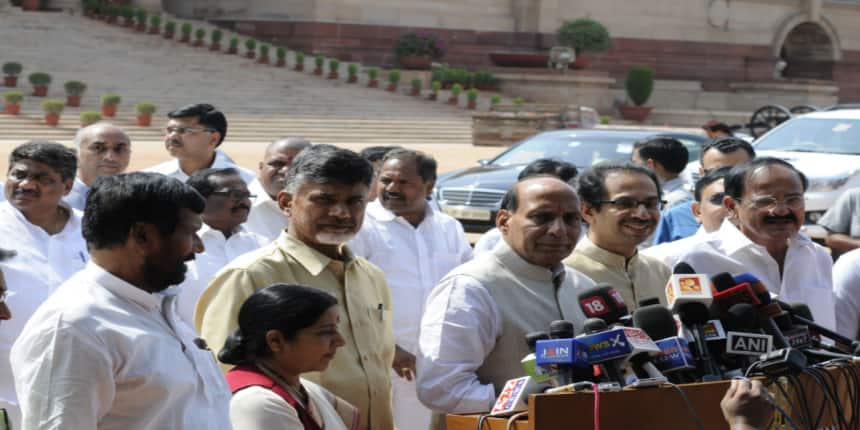NDA BJP Full Form
What is the full form of NDA?
The NDA BJP stands for National Democratic Alliance Bharatiya Janata party. It is called a coalition of prominent political parties operating across the whole country and currently, NDA is led by BJP(Bharatiya Janata party). Amit Shah is the chairperson of this alliance at present time. It is a conservatism ideology-based centre to right-wing big tent political alliance. There are more than 20 parties in this alliance. This alliance was formed in 1998 and evolved into the league of dominant and aggressive parties. In 2014 Mr. Modi was elected as leader of the Bharatiya Janata Party and also took oath as the new prime minister on 26th May 2014.
- What is the full form of NDA?
- What is NDA BJP?
- List of NDA Partners (NDA Parties)
- History of NDA
- Structure of NDA
- Achievement And Alliances of NDA

What is NDA BJP?
NDA is a conservative political alliance, center right to right-wing, and led by the Bharatiya Janata party. Currently, it controls the Indian government as well as many state governments.
List of NDA Partners (NDA Parties)
There are more than 20 members in the NDA. But from time to time some parties also left this coalition and some have joined this coalition. The following are the important partners of NDA at present time:
Bharatiya Janata Party (BJP) - leader and National Party
Pattali Makkal Katchi from
All India Anna Dravida Munnetra Kazhagam (AIADMK)
Lok Janshakti Party from Bihar
Tamil Maanila Congress
National People's Party
Hill State People's Democratic Party
Jana Sena Party
Rashtriya Samaj Paksha
Republican Party of India (Athawale) from Maharashtra
Apna Dal (Sonelal)
Mizo National Front
All Jharkhand Students Union
Nationalist Democratic Progressive Party
Sikkim Krantikari Morcha
United People's Party Liberal
All India N.R. Congress
Jan Nayak Janta Party
Indigenous People's Front
Asom Gana Parishad
History of NDA
The NDA was formed in May 1998, as a coalition for general assembly elections. The main objective of the NDA was to form an anti-congress alliance. This federation is led by bjp and also includes many regional parties such as the Samta party, Asom Gana Parishada etc. But from time to time some parties broke away from NDA such as Shiv Sena broke away from NDA in 2019 to join the Maha Vikas Aghadi with Congress; another party NCP also broke away from the NDA alliance in 2003. NDA’s first chairman was Atal Bihari Vajpayee from 1998 to 2004; from 2004 to 2014 Mr. L.K Advani was the chairman of this alliance, while Amit shah is having responisbility of chairman of NDA since 2014. Currently, NDA controls the central government along with the governments of 15+ States and one union territory.
Structure of NDA
There is no such specific structure of NDA. All the decisions such as regarding ministers, election seats, and other important issues brought up in Parliament by the individual parties and leaders and NDA never interferes with this. Now there may be many conflicts with this from other parties and may have different votes in the alliance. There is a solution to this situation. For this, an NDA convener is selected to resolve this problem.
Achievement And Alliances of NDA
Currently, the NDA Alliances formed its government or in coalition with other parties in 17 states along with the central government. Its popularity increased after consecutive wins in the general elections in the country. It has formed its sole party government in many states such as Madhya Pradesh, Uttar Pradesh, Uttarakhand, Gujarat etc. This has also made a coalition with several state based parties such as Meghalaya, Bihar, Odisha, etc. But there are also three states in which it has never made its government. These states are west Bengal, Kerala, and Telangana.
Frequently Asked Questions (FAQs)
Mr. Atal Bihari Vajpayee was the first prime minister of India when NDA came into power. He remained in power till 2004.
Shard Yadav replaced George Mathew as a convener in 2008, because of his ill health.
UPA stands for United progressive alliance. It is also a coalition formed by several parties in India in 2004 after the general election. It is considered the rival of the NDA government formed at the center.
NDA came into existence for the first time in 1998.
No, Bharatiya janata party is not separating from NDA, rather many other parties are separating from this alliance.